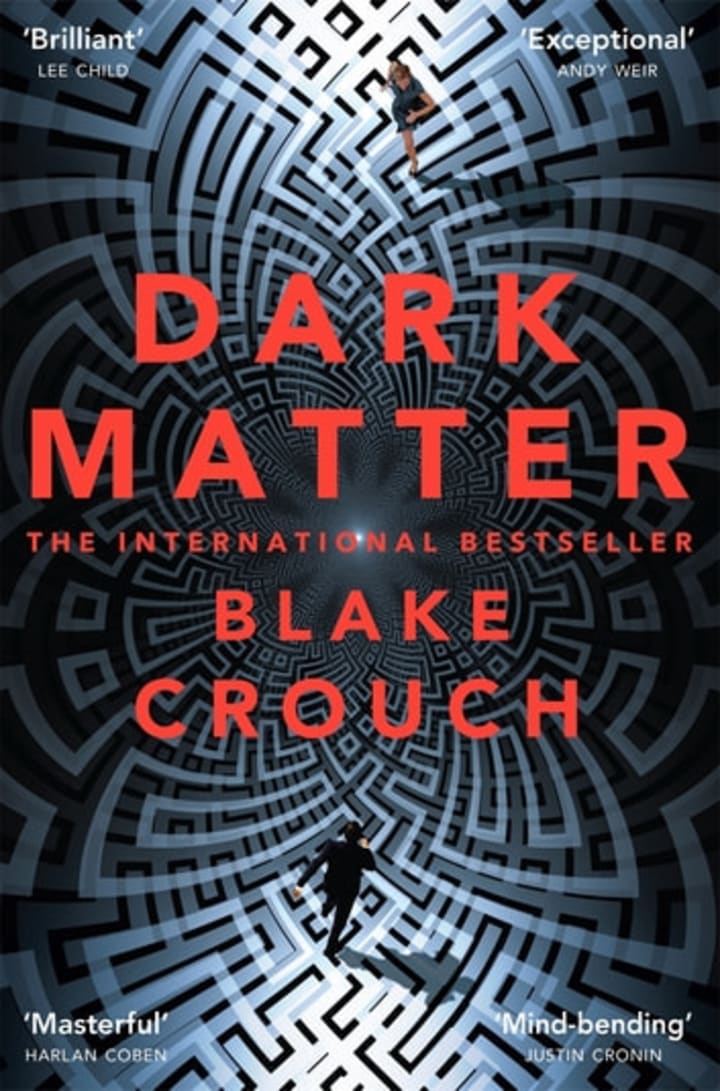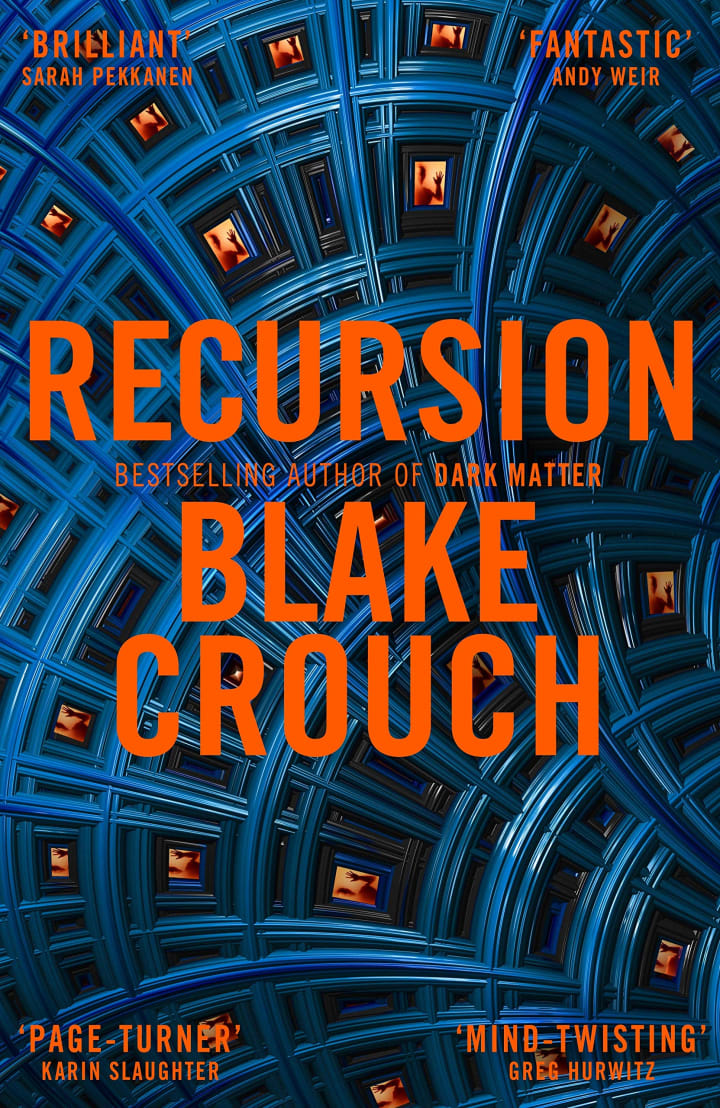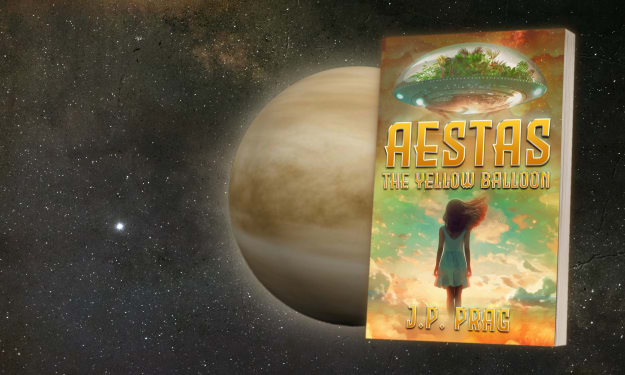Traveling through Time in the Tales of Blake Crouch
Let's discuss two different flavors of time travel.

Time. It is a fascinating thing. It always keeps moving. Sometimes it passes too quickly. Sometimes it feels awfully sluggish. But the clock is always ticking. And yet sometimes it has the tendency to stand absolutely still. Time really is a mysterious thing. We, humans, have always been obsessed with time and its passage, which is why we have invented a plethora of methods - sundials, hourglasses, clocks - to measure it. We celebrate, and at the same time mourn, the passage of time. And the one thing that we want to do the most is to travel through time. Even while having casual conversations, we end up talking about time travel quite a lot. Questions like what would we do if we were given a chance to travel back in time, what would we tell our past selves, or what would we ask our future selves, turn out to be great conversation starters. Our obsession with time travel has been well represented in both the literature and the movies. The Time Machine by H G Wells introduced us to the idea of traveling through time with the help of a device in 1895. Stories like Kindred by Octavia E Butler, 11/22/63 by Stephen King, The Christmas Carol by Charles Dickens, The Midnight Library by Matt Haig, and The Last Magician by Lisa Maxwell, all have the main character(s) interacting with and/or manipulating the flow of time. Even Hermione traveled through time in her third year at Hogwarts. But all excursions through time are not identic. Every story adds its own flavor to the concept of time travel. Please have a look here to enjoy the very many realizations of time travel in books and movies.
Here, in this blog, I want to discuss two stories by Blake Crouch - Dark Matter and Recursion - both of which have elements of time travel. Blake Crouch is an American author who has also penned the Wayward Pines Trilogy (published 2012 - 2014) and Upgrade (published 2022). He published Dark Matter in 2016 and Recursion in 2019. Primarily, the main characters in both these stories travel through time. However, the flavor and execution of the time travel are very different in both of them.
Dark Matter introduces us to the idea of multiple realities. The story talks about how each one of our choices can lead to a fork in our reality and how that leads to countless possibilities. The main character travels through not only time but also through the parallel realities that were created through the variety of decisions that he had made in his life. For example, when in a reality the main character decides to pursue his research, there is another reality, simultaneously present, in which the main character has decided not to pursue his research and is engaged in something completely different. Therefore, when our main character moves through these different realities, he encounters different copies of himself, each of whom is living their own separate life.

On the other hand, Recursion talks about how our consciousness can be transported back to our past selves. So, when we are transported back in time, instead of meeting a copy of our past selves, we wake up in the body of our past selves along with all the knowledge and experience that our current consciousness has acquired. For example, let's say that our main character decides that they wish to go in time and relive the past week. So, they transport their consciousness to their former (a week younger) self. From here on, the main character can continue living on in the body of this younger past self and they will continue to have memories of their original timeline. So, in this story, there aren't any copies. It is just one individual who gets to live their life over and over again.

In my head, I visualize the time travel of Dark Matter as one where we travel through the different planes of realities, each of which has a separate version of ourselves, and hence, I associate a sense of concurrency and parallelism with the elements of time travel in this book. On the contrary, the time travel of Recursion has, quite literally, a recursive tone, wherein the main character can travel and live through the same reality again and again. Hence, I associate a sense of recurrency and serialism with the elements of time travel in this book.
Given the basic idea of what time travel looks like in both these books, let's now discuss the storylines of these books. Dark Matter begins when our main character, Jason Dessen, a man with a wife and a kid, gets abducted from his reality and is sent to an alternate version of his life. In this alternate version, he is a renowned person. However, in this life, he has n0t married and has no child. He lives a quiet, lonesome life. It takes him a while to understand what is going on and from there he starts his quest to get back to his "own" reality. From here on, the story is basically a roller coaster ride of twists and turns. I didn't see a lot of them coming and was very much blown away by each one of them. We, as readers, get to dwell on the idea of how much our choices can shape our lives. I loved the premise of the story, the characters, as well as the narration. The story is not very science-heavy, but it does require attention at times to understand what has been going on.
In Recursion, we follow two main characters - Helena, who is a researcher, and Barry, who is a Police Officer. Helena is working on a project that allows her to map the neurons of our brains associated with a particular memory. Her idea is that once a set of memories are mapped, firing the same set of neurons externally will allow us to relive those memories. Instead, she ends up building a machine that, once having mapped a particular memory, can transport people's consciousness to their past selves at the exact time of the memory. Barry, on the other hand, is trying to solve a suicide committed by a person afflicted by a mysterious condition called the "False Memory Syndrome". In his attempts to get to the bottom of this mysterious condition, he encounters the memory mapping machine and gets caught up in the world of time travel. Memory plays a huge role in this story and we explore the ideas of how our memories can make or break us. Again, as with Dark Matter, I really enjoyed the concept of the story. I especially liked the beginning when the characters are introduced and the stage is set. It's done in a manner that will instantly encapture your attention and will urge you to turn the page for more.
Nevertheless, as with any other story, there were aspects in both these books that I did not enjoy. When it comes to Dark Matter, I actually enjoyed everything until the very end. There was a sense of urgency about the return of the main character to his "own" reality. How will he come back to his reality, what if he could not "find" his reality, what if he gets killed in another reality, what will happen once he gets back to his reality - all these questions and more were asked, which kept me highly intrigued all through the way. As I said before, I really didn't anticipate several of the conflicts that emerged when our main character was traveling through multiple realities. But another thing that I did not anticipate was how quickly and easily everything was resolved at the end. With the amount of build-up with "all-the-possibilities-that-can-happen", the ending did fall short in my opinion. I had similar issues with Recursion. It had such a nice concept that associated time travel with memory, but as the characters could just start living their lives on a loop until the main conflict is resolved, there was no sense of urgency or dread associated with the conflict anymore. The conflict itself was introduced much later in the story, which, in itself, is not actually a criticism as it did allow us to spend some time understanding the causes and consequences of the time travel. But the introduction of the conflict was quite abrupt and did not feel organic. After a while, the story started to feel a bit monotonous. And maybe because of this drag, I was not able to enjoy the ending and everything felt a bit anti-climactic in the end.
Wrapping up, I think that I enjoyed Dark Matter more than Recursion. I believe I like the idea of having multiple realities and possibilities all around us much more fascinating than just going back in time and living the same life again. And because of my preferences, I can clearly understand why I am drawn more toward the tale of Dark Matter. Even though I have my favorite, I will never shy away from recommending both these books to people who are looking for stories that allow them a walk down the time lane.
Please comment down below and let me know if you have read these books or are interested in reading them. Also, if you have read the books, let's talk about the different aspects that you liked and disliked in these books.
About the Creator
Kaumudi Singh
I love reading, traveling and photography. And I write because I love sharing my experiences.






Comments
There are no comments for this story
Be the first to respond and start the conversation.